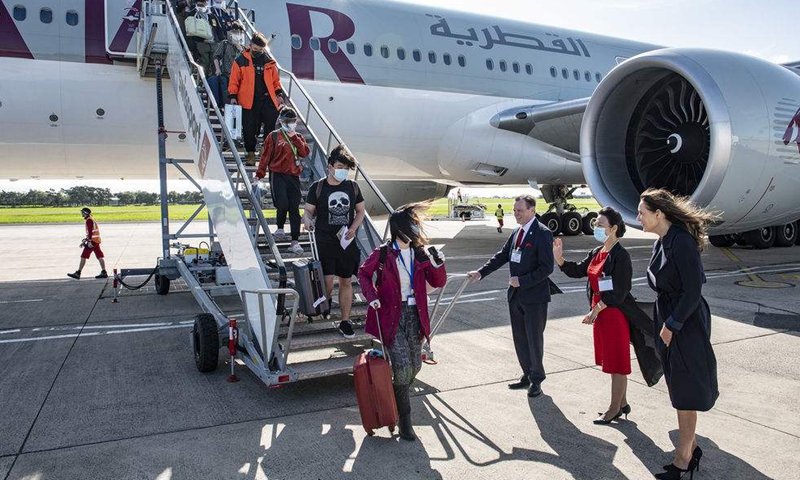UK universities embrace Chinese students with charter flights, COVID-secure measures
By Sun Wei and Fan Anqi Source: Global Times Published: 2020/9/24 0:20:41

Photo: Weibo
As universities in the UK reopen their campuses, Chinese students are travelling via chartered flights to the UK at a time when international travel has been severely impacted by the pandemic.
Queen's University Belfast was one of the first in the UK to charter a dedicated, direct flight from Beijing for students. Right after the flight arrived safely on September 19, students were transported privately and directly to campus from the airport and provided with safe and supported quarantine accommodation.
“The university took this decision independently and with the assistance of an agent, to help reduce stress and anxiety for those making the trip to Belfast and to provide reassurance for our students and their families,” Zara McBrearty, communications officer of Queen’s University Belfast, told the Global Times, adding that this effort shows their commitment to the students.
All students provided evidence of a negative COVID-19 test 48 hours before departure and none of the students displayed symptoms at the time of travel.
More universities are following Belfast’s lead. In partnership with Hainan Airlines, another chartered flight arranged by 23 UK universities arrived Monday morning in Manchester from Chongqing, Southwest China, with students travelling to universities in the North and South West of England and Wales.
Hainan Airlines has been constantly reminding Chinese students through text messages and emails to take nucleic acid tests 72 hours before boarding to avoid cross-infection and delays. “Strict social distancing measures have been implemented during the check-in and boarding process. Special personnel have been arranged to verify health codes and check temperatures. The cabin toilets and communal areas are being cleaned and disinfected every hour during flights. Spaces have been allocated in the rear of the flight for emergency use,” Hainan Airlines told the Global Times.
According to Jordan Kenny, news and media relations manager with the University of Manchester, from Friday this week, there will be daily flights with domestic connections from a number of airports in China. All passengers arriving in the UK from China are subject to health screening and are required to self-quarantine for 14 days on arrival.
Measures have been taken to make sure that “students are able to travel directly to their university without mixing with other passengers, as required by the Chinese Ministry of Foreign Affairs,” Kenny told the Global Times.
According to a recent report by The Times newspaper, more than 24,000 Chinese students sought admission to British universities this year, up by 23 percent, of whom 8,570 were accepted, a rise of 14 percent. The increase in numbers has been welcomed by universities and affirms the results of a recent survey that showed the UK to have overtaken the US as the most desirable destination for Chinese students.
Universities in the UK are cautiously reopening with COVID-secure measures in line with Public Health Agency guidance to allow students to begin their studies in a safe environment.
Queen’s University Belfast “will be providing as much face-to-face teaching as possible within the context of social distancing, but large lectures will be delivered online at the start of the semester. This will be under constant review and adapted as necessary to meet the needs of the latest public health advice,” according to McBrearty. A range of other measures including one-way systems, hand washing or sanitizing stations and capacity restrictions are also in place.
As overseas students still face barriers to reach UK campuses, such as visa applications, government restrictions on travel and availability of flights, universities are trying to be flexible toward international students.
Kenny explained that for the majority of courses at the University of Manchester, there is some flexibility around start dates for this year so students will be able to register and start the course online before travelling to the UK at a later date in most cases.
The UK government on Tuesday tightened restrictions to battle against a second wave of coronavirus infections. Prime Minister Boris Johnson said measures were needed now to prevent further, more costly, action later. Another 4,926 people tested positive for the coronavirus in the UK on Tuesday.
Posted in: EUROPE